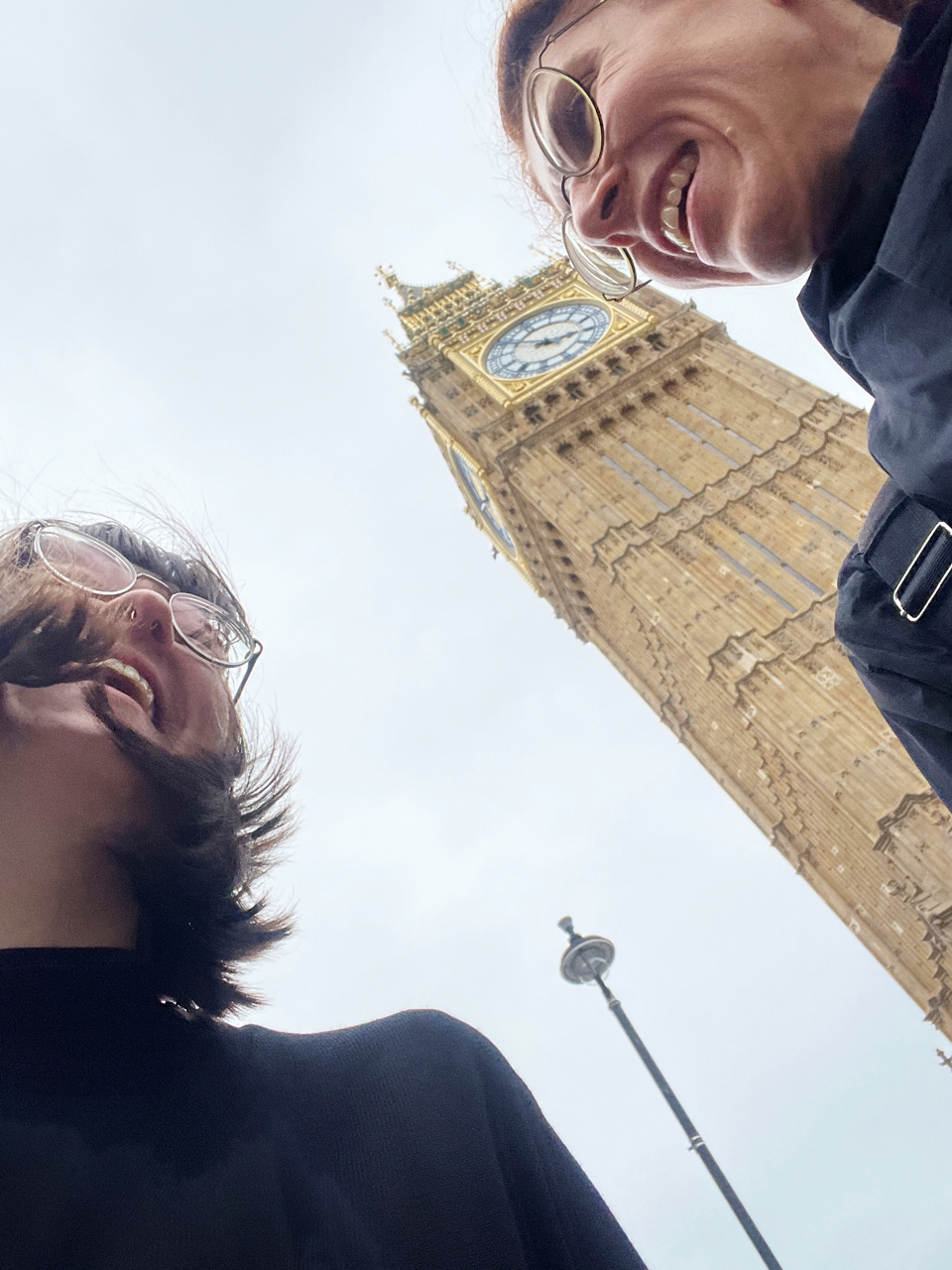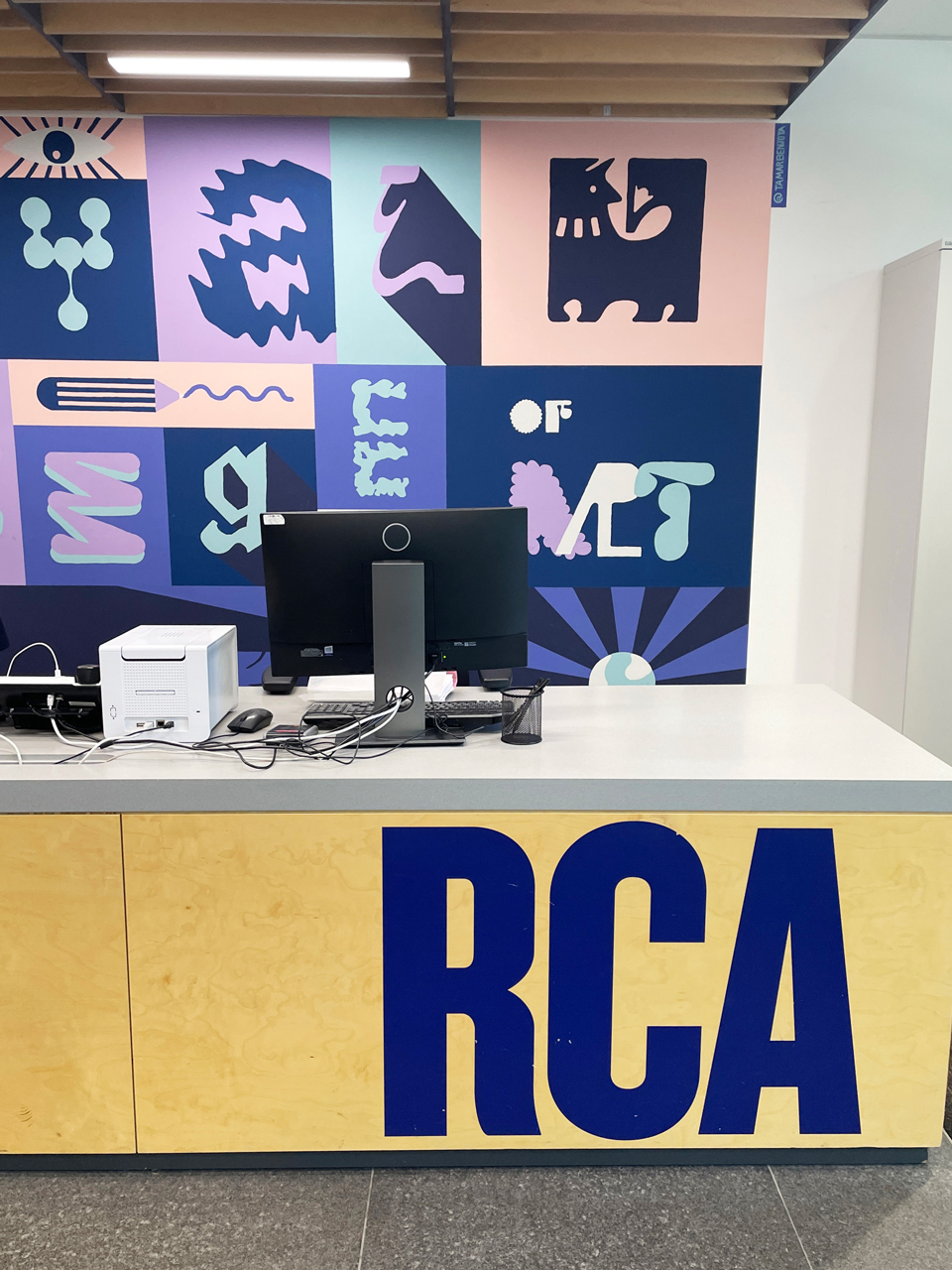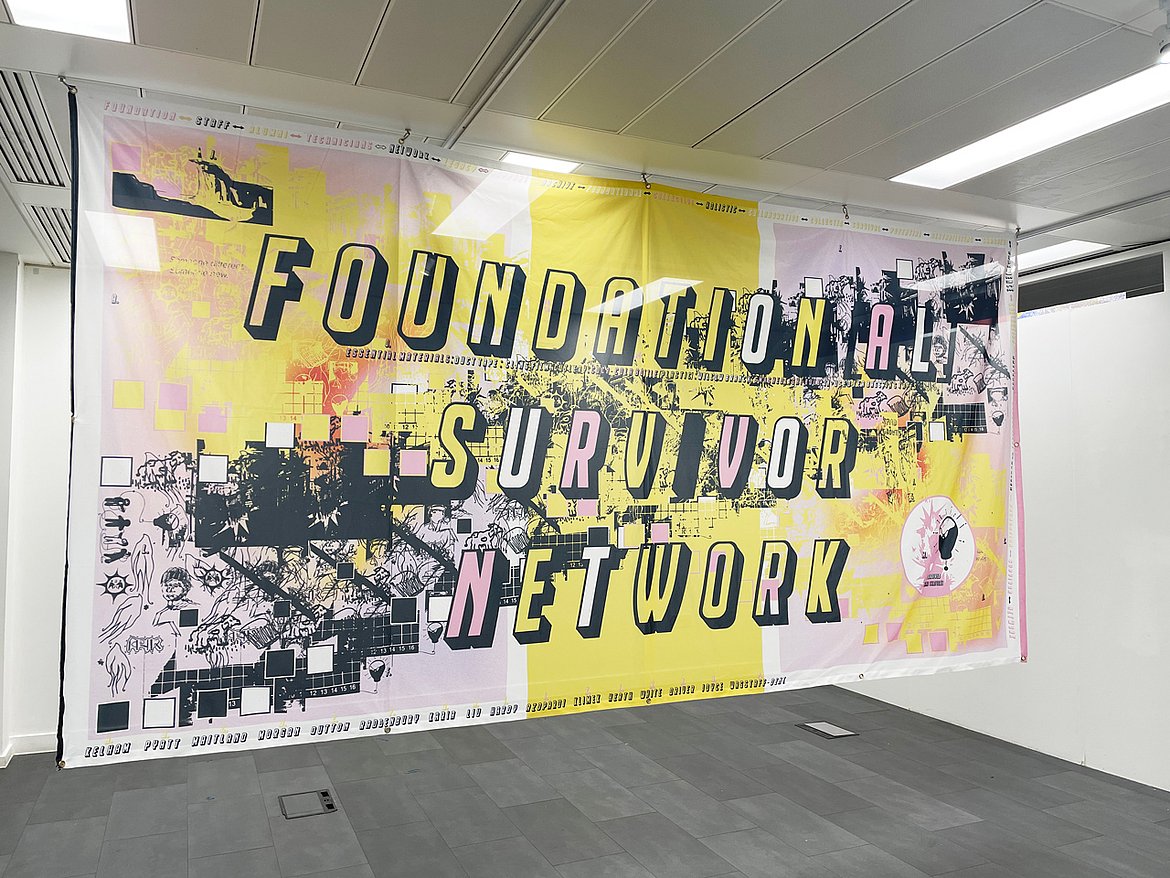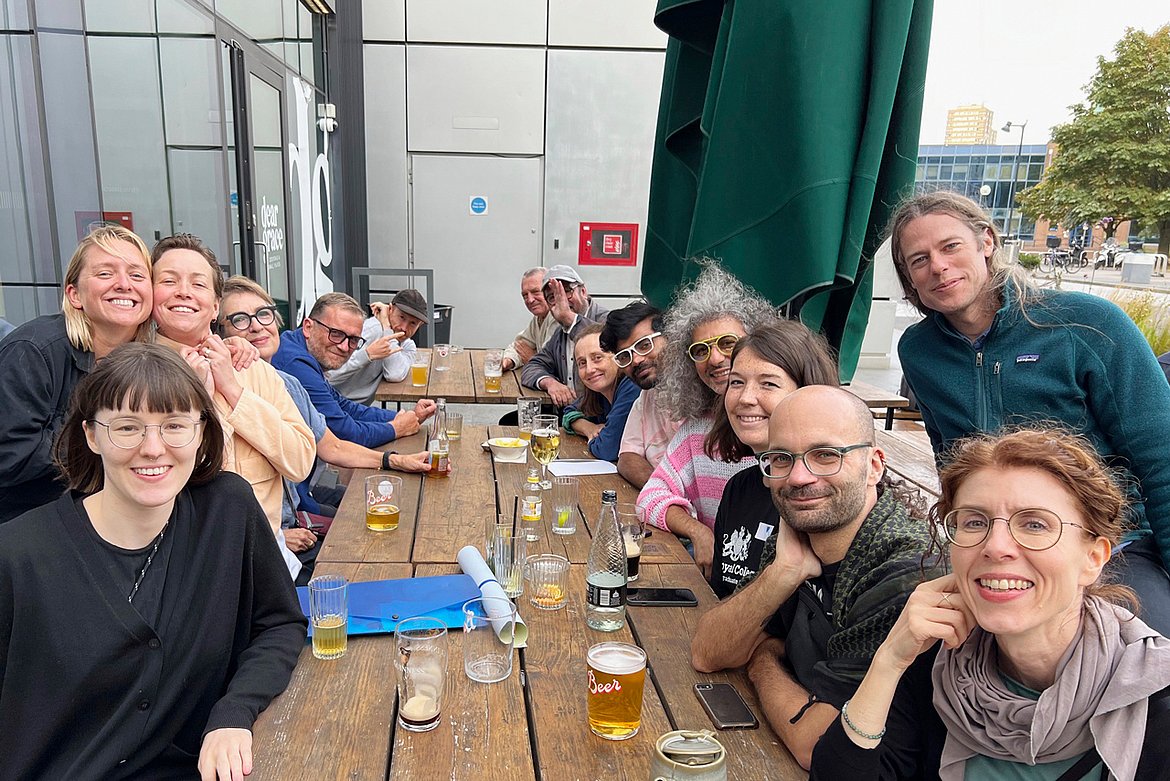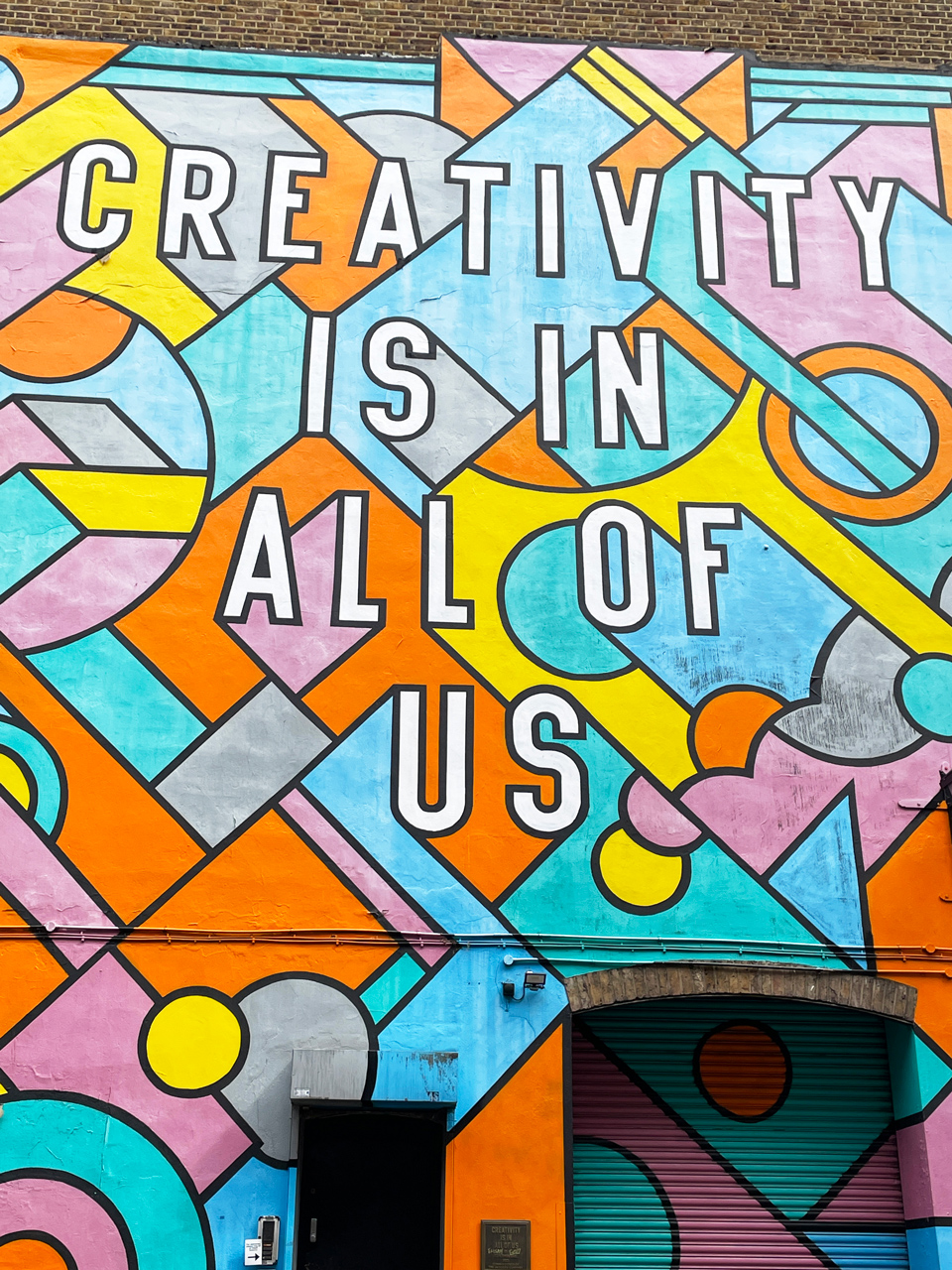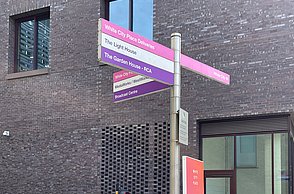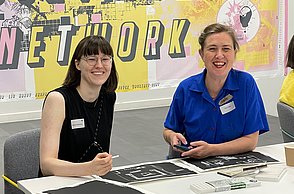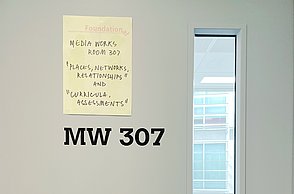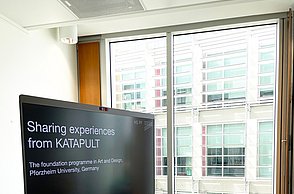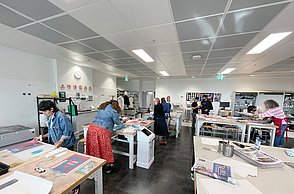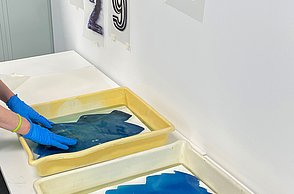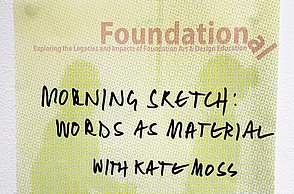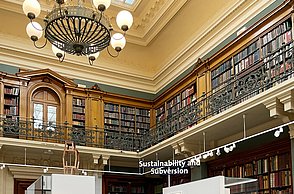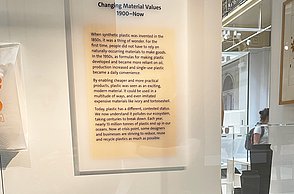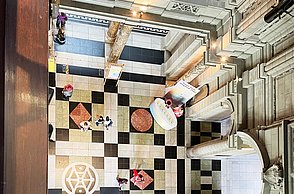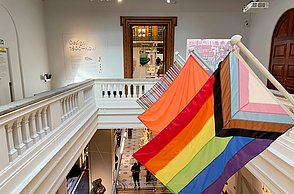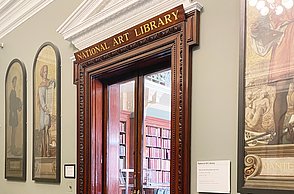Nadine Hecht and Katharina Wittemann in London, UK
Wir wurden eingeladen, unser Design-Grundlagenprogramm KATAPULT Ende August 2024 auf dem INFE-Symposium „Foundational” am RCA White City Campus in London vorzustellen. INFE ist das Internationale Netzwerk der Grundlagenausbilder. Das dreitägige Symposium befasste sich mit dem Erbe und den Auswirkungen der Grundlagenausbildung in Kunst und Design und wurde in Zusammenarbeit mit dem Royal College of Art in London und der Universität der Künste in Helsinki organisiert:
„In Kunsthochschulen und darüber hinaus wird häufig davon gesprochen, dass Grundkurse in Kunst und Design einen entscheidenden Moment im Leben der Menschen darstellen. Das Symposium „Foundational” wollte untersuchen, inwiefern dies zutrifft: Es stellte die Frage, inwiefern Grundkurse und ihre Entsprechungen auf internationaler Ebene und in anderen Bildungsstufen grundlegend sind, welche Erfahrungen den Menschen geblieben sind und weiterhin ihr persönliches, berufliches und kreatives Selbst prägen. Welche Aspekte der Grundlagenausbildung wurden von anderen Bildungsebenen übernommen und angepasst, und warum scheint dies immer häufiger der Fall zu sein? Wie können wir beginnen, diese Erfahrungen zu archivieren, und wie können wir sie mit Hilfe künstlerischer Forschungsmethoden kreativ untersuchen? Wie können wir sicherstellen, dass künftige Generationen weiterhin von den Erfahrungen dieser Pädagogik profitieren können? (https://www.rca.ac.uk/news-and-events/events/foundational-day-two-three, 06.09.2024).
Wir haben durch Chloé Briggs, die im Rahmen des Erasmus+ Mobilitätsprogramms bei KATAPULT unterrichtet, von INFE erfahren. Sie ist eine britische Künstlerin und Pädagogin, die in Paris lebt und arbeitet und über langjährige (inter)nationale Erfahrung in diesem Bereich verfügt. Sie hat uns die Ausschreibung weitergeleitet, und wir haben einen Vorschlag für einen Vortrag am zweiten Tag eingereicht.
Der erste Tag („Archive”) fand im Juni online statt. Die Referenten untersuchten verschiedene Archive und begannen sich vorzustellen, wie ein Archiv für Kunst- und Designausbildung aussehen könnte. Wir hörten vom National Arts Education Archive, das Werke aus verschiedenen Epochen und verschiedenen Kunstschulen seit der Kindheit aufbewahrt. Interessant war auch, etwas über die lebendige Geschichte der grundlegenden Sammlungen und Archive der RCA zu erfahren, die eine Reihe von Materialien von Textdokumenten bis hin zu studentischen Arbeiten enthalten. Dieses Archiv zeigt einen Wandel von einer starren Ausbildung in den Anfängen hin zu einer flexibleren und offeneren Lehrmethode. Genau wie in unserem heutigen KATAPULT-Programm werden technische Fähigkeiten, berufliche Vorbereitung und persönliche Entwicklung zusammen als eine angemessene Grundlage für die Kunst- und Designausbildung angesehen. In anderen Präsentationen wurden Aspekte wie Dekolonialisierung und Partizipation diskutiert. Die Hauptrednerin Ekua McMorris sprach über die Integration von Forschung in die Grundlagenausbildung und die Förderung des Bewusstseins für die Nutzung von (Grundlagen-)Archiven, was nicht nur für KATAPULT, sondern auch für das KUPFER-Projekt an der Fakultät für Design relevant ist.
Der zweite Tag („Narratives“) fand in London statt und bestand aus 23 Vorträgen, die sich mit dem Erbe der Grundlagenausbildung in Kunst und Design befassten. Der Inhalt war in sechs Themen unterteilt, von denen zwei gleichzeitig in drei verschiedenen Räumen stattfanden: „Setting Scenes”, „Evolutions”, „Reverberations”, „Agency and Journey”, „Places, Networks, Relationships” und „Curricula, Assessment”, an dem wir teilnahmen.
In unserem Raum hörten wir zunächst Vorträge zum Thema „Orte, Netzwerke, Beziehungen“.
Paul Taylor vom Carlisle College of the Arts sprach über seine 40-jährige Erfahrung in der Lehre an der Foundation, die er als Netzwerk von Prozessen und als Feier des Provisorischen bezeichnet.
Doug Bowen von der British Higher School of Arts and Design in Moskau erzählte Geschichten von Absolventen der Grundlagenausbildung und betonte die „Kunst der Anleitung“ von Studierenden der Grundlagenausbildung sowie den wesentlichen Aspekt der interdisziplinären Zusammenarbeit. Für ihn ist die Grundlagenausbildung ein Netzwerk von Beiträgen.
Chris Roberts und Gabriel Birch von der University of the Arts London sprachen über die Grundlagenausbildung „über das Studio hinaus“ und gaben ein Beispiel für eine Exkursion im Bereich Umweltkunst, bei der Forschung und Prozess im Mittelpunkt standen.
Raz Barfield von der Glasgow School of Art/China Central School of Art reflektierte über die Grundlagenausbildung in einem transnationalen Kontext. Bei der Zusammenarbeit mit Studierenden aus China und Schottland sah er sich mehreren Herausforderungen gegenüber. Die Sprachbarriere wurde beispielsweise durch eine Änderung des Lehrplans verringert, in dem Sprach- und Praxiskurse kombiniert wurden.
US Ramesh Kalkur vom Srishti Manipal Institute of Art, Design and Technology stellte den modularen Lehrplan ihres einjährigen Grundstudiums vor. Der Rahmen besteht aus Modulen wie „Spielen und Erfinden“, „Ordnung und Chaos“ oder „Gemeinschaft und Praktiken“. Er betonte auch, wie wichtig es ist, prozessorientierte Grundlagen statt (fachspezifischer) Fähigkeiten zu vermitteln.
Adam Farcus von der University of South Florida stellte das Konzept der arbeitsbasierten Bewertungsverträge im Kunstunterricht vor, bei denen die Förderung der intrinsischen Motivation der Studierenden und die Minimierung von Vorurteilen im Mittelpunkt stehen. Er verwies auf sprachwissenschaftliches Forschungsmaterial, da es an Referenzen aus der Kunst mangelt. In seiner Rede lud er uns auch zur nächsten FATE-Konferenz (Foundations in Art: Theory and Education) in Washington D.C. ein, die alle zwei Jahre stattfindet. Das FATE-Netzwerk hat seinen Sitz in den USA und Kanada und besteht seit über 30 Jahren.
In unserem Vortrag teilten wir Erfahrungen aus KATAPULT: Wir stellten das Programm selbst vor, sprachen über die Auswirkungen auf die Schüler (auch speziell auf Katharina Wittemann), gaben Einblicke in die Perspektive der Pädagogen, zeigten einen Überblick über unsere Programmevaluierung und fassten Besonderheiten unserer pädagogischen Grundlagen zusammen.
Der dritte Tag begann mit einer inspirierenden Keynote von Prof. Jaana Erkkilä-Hill von der Universität Lappland, Finnland. In ihrem Vortrag „Old school art school – artist led pedagogy” sprach sie über die Gemeinsamkeiten zwischen Studierenden und Lehrenden und bezog sich dabei auf ihre eigenen Lehrerfahrungen an der Nordic Art School. Dort arbeiteten und lebten Künstler und Studierende zwei Wochen lang zusammen, wobei das praktische Lernen innerhalb eines festen Rahmens intensive Prozesse und den persönlichen Dialog förderte.
Am Nachmittag des dritten Tages nahmen die INFE-Teilnehmer an verschiedenen Workshops teil, die auf Methoden der Grundlagenpädagogik für Kunst und Design sowie der künstlerischen Forschung basierten. Zunächst besuchten wir den Workshop „Morning sketch: words as material” von Kate Moss, einer in Schweden lebenden australischen Künstlerin. In vier Übungen erkundeten wir Methoden des kreativen Schreibens und diskutierten die künstlerische Qualität von Poesie. Anschließend nahmen wir an einem Cyanotypie-Workshop von Robert Roach, Gabi Mind und Chrissie Peters von der University for the Creative Arts in Canterbury teil. Wir lernten den Prozess der Erstellung eines Schwarz-Weiß-Entwurfs kennen, den Umgang mit dem lichtempfindlichen Material und die Entwicklung des Bildes mit Wasser.
Zwischen den Einheiten gab es mehrere Plenardiskussionen und Raum für persönliche Gespräche. Wir stellten in vielen Aspekten eine gemeinsame Tendenz fest. Insbesondere die Tatsache, dass die Grundlagenausbildung mehr Unterstützung in Bezug auf den Nutzen von Grundlagenprogrammen und in Bezug auf die Finanzierung benötigt. Viele leidenschaftliche Stimmen betonten die transformative Qualität der Grundlagenausbildung: Die Erfahrung experimenteller, prozessorientierter Arbeit nach der Schulausbildung und vor dem Studium öffnet den kreativen Geist und stimuliert die persönliche Entwicklung. Dies führt zu einem individuellen „Aha-Erlebnis”, das alle Grundlagenstudierenden zu haben scheinen und das zur beruflichen Orientierung führt. Selbst viele Jahre später, nachdem sie eine kreative oder andere Karriere eingeschlagen haben, schätzen die Alumni die Auswirkungen ihrer Grundausbildung. Aus diesem Grund wurde die Bedeutung eines Alumni-Netzwerks der Grundausbildung als Instrument zur Unterstützung der Relevanz der Grundausbildung diskutiert. Darüber hinaus wurden Maßnahmen wie Veröffentlichungen, Forschung und Konferenzen erwähnt. Interessant war auch zu hören, dass es im Gegensatz zu Deutschland in Großbritannien Akkreditierungsstandards für die Grundausbildung gibt, was auf die lange Tradition britischer Grundausbildungsprogramme zurückzuführen ist.
Die gemeinsame Stimme engagierter internationaler Stiftungspädagogen zu spüren und zu hören, war für uns eine wertvolle Erfahrung und hat das Potenzial dieses Netzwerks deutlich gemacht. Sei es durch zukünftige Kooperationen, das Lernen von Best Practices oder den Nutzen von Vor-Ort-Konferenzen wie diesem Symposium.
Vielen Dank an die Initiatoren von INFE und an das Team, das diese Veranstaltung ermöglicht hat. Wir freuen uns auf das nächsten Mal!
_____________________________________________________________
INFE Symposium: www.rca.ac.uk/news-and-events/events/foundational-day-one www.rca.ac.uk/news-and-events/events/foundational-day-two-three
INFE Instagram: https://www.instagram.com/infe_foundations
KATAPULT: designpf.hs-pforzheim.de/katapult
Photos: Nadine Hecht, Katharina Wittemann, Group photo by Patricia McMeans

